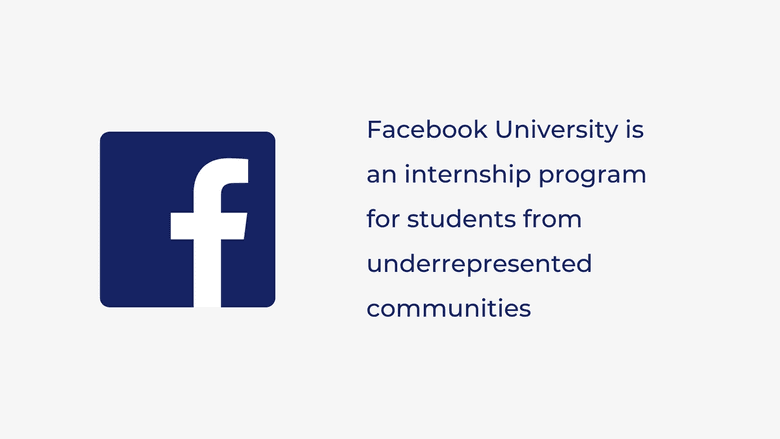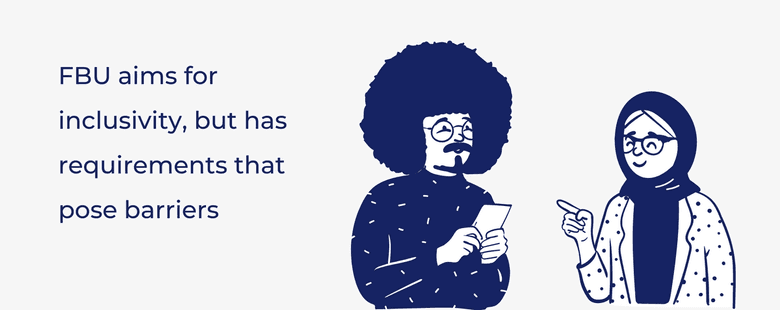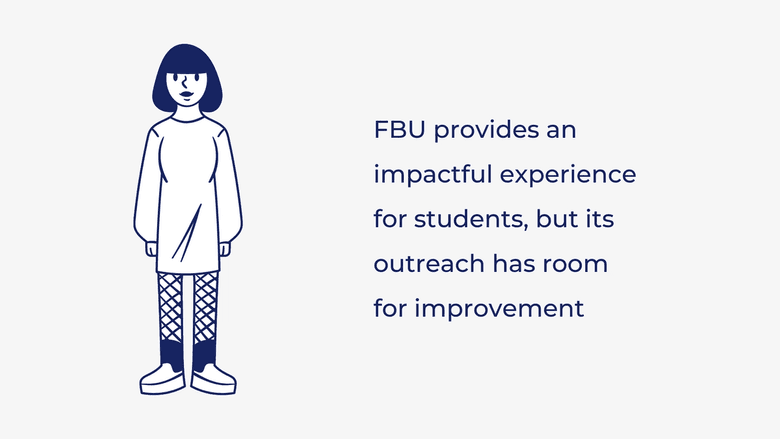Facebook University's Aim to Reach Underrepresented Communities
Is FBU the future of diversity & inclusion in tech, or is it falling short?
While the tech industry has slowly been working to increase accessibility and diversity, companies have started taking more active roles to make this a reality. Now, with the COVID-19 pandemic and online education creating a "new normal," countless young and hungry minds are seeking opportunities to enrich their educational experience. A popular avenue is through programs with prestigious tech companies, one of which is Facebook.
What is the Facebook University (FBU)?

According to Facebook Careers, "Facebook University is a hands-on, immersive internship program that enables students from underrepresented communities to get to know Facebook’s people, products and services."
This eight-week internship program places interns on different teams like product design, engineering, operations and analytics. While each team has varying qualifications, requirements and benefits, all require interns to be available to work in the United States during the program, in addition to specific university enrollment requirements. Application deadlines and program scheduling differ by the team as well.
👉 Want help preparing? Schedule a mock interview with us today.
Let's dive deeper into some of your options.
1. Product Design
Interns in this group experience training during their first week, followed by seven weeks of hands-on experience with mentors. It includes visual design and interaction design for a Facebook product.
The application for the Class of 2021 opened on December 1, 2020, and closed on January 18, 2021.
2. Engineering
Interns in this group undergo mobile development training in IOS or Android for three weeks and continue the next five weeks with hands-on experience with mentors for guidance in a small team setting.
The application for the Class of 2021 opened on August 24, 2020, and closed on October 7, 2020.
3. Operations
Interns in this group are given non-engineering positions within Facebook and are tasked with focusing on the safety and enjoyability of the company's products and technology for Facebook users.
The application for the Class of 2021 will open later this fall, according to its website. You can find updates here.
4. Analytics
Interns in this group are taught about roles in data engineering, data science and more. Analytics interns receive hands-on experience by working on data-intensive analysis for a product or business at Facebook, while being guided by a mentor.
The application for the Class of 2021 opened on October 1, 2020, and closed on November 10, 2020.
👉 Read Next: Is the Facebook University Analytics Program right for you?
Through the program, interns work side-by-side with Facebook employees in an intensive, experiential and accelerated environment to serve an active role in the company while interning. Roles are typically offered to rising college sophomores and juniors from underrepresented communities, to increase accessibility and opportunities among students.
If you missed the window for FBU, don't worry! New grads have countless full-time opportunities worldwide. Current students are also encouraged to apply to Facebook internships outside of FBU in locations like New York, Menlo Park, San Francisco and more. Due to the pandemic, certain internships have transitioned into a remote setting, but are still listed on career sites under specific regions. If an intern is hired for a remote role, they are required to work in the region they were assigned for the entirety of their internship.
What Do Diversity and Inclusivity Look Like at FBU?

Through its site and social media presence, FBU advertises its aim to be inclusive, especially with its focus on recruiting students from underrepresented communities. The program's site leads to Facebook's Diversity page which includes posts about program opportunities, financial opportunities, events and anecdotes. "We are dedicated to creating an environment where people can be their authentic selves and share their own diverse backgrounds, experiences, perspectives and ideas," according to the 'About' section of their Facebook page. There are also links to their LinkedIn and Instagram pages.
While FBU seeks to enable students from underrepresented communities, all four groups require applicants to be currently enrolled in a four-year program, or equivalent program for special cases, in the United States. Having this requirement does pose a barrier for many, not just those in underrepresented communities, as four-year programs can be exclusive.
In the United States, statistics from 2018 show that 71.1 percent of all college students attend four-year institutions while 28.9 percent attend two-year institutions. These same statistics also show how 33 percent of white Americans have a bachelor’s degree compared to Latinx or Black Americans being 16 and 19 percent, respectively. This four-year requirement may seem minor, but does pose an obstacle for some seeking to complete a prestigious internship like this.
Looking from an anecdotal lens, a 2017 blog post from Facebook Careers shared experiences of former interns at FBU, one of whom discussed feeling Imposter Syndrome during the program. Imposter Syndrome is a psychological experience in which a person doubts their abilities and accomplishments and is worried about being a fraud. 70 percent of the United States population will have experienced Imposter Syndrome at least once in their lives, and underrepresented communities are more susceptible due to microaggressions, biases, lack of representation and more. The FBU intern wrote about feeling "underqualified" to be working at Facebook, surrounded by other skilled interns. But upon talking with others, this intern discovered how practically "everyone feels this way sometimes."
A 2015 Medium article discussed the experience of being a woman in computer science and how vital it was to attend Facebook University. While the author was concerned about having to be surrounded by a majority of men at the program, as she had experienced in high school, her excitement returned in waves after attending FBU. Not only did the program provide an applicable education she was searching for outside of her Stanford University computer science classes, but the real-world experience she received was also empowering. "If you’re a woman in CS, FBU will give you the optimism it gave me to carry through the unique challenges you’ll face in an 88% male field," she wrote in the article.
Fulfilling the Message

So does FBU fulfill its objective of reaching out to underrepresented communities? Anecdotes show that the students who participate do have impactful experiences, both personal and educational. This in itself is incredibly important, as the lasting effects of this program break down barriers for students, and instead replace them with excitement, confidence and community to pursue this field.
But, the outreach for FBU can be improved upon. As previously mentioned, the application process poses challenges for students who may not have as many resources as others who seek the same opportunities. While it seems that once students are accepted into the program, they're in for an influential experience, it's a matter of how these students will get there, and if FBU will choose to further break down those barriers in the future.
👉 Want to know what it's like working at Facebook? Read more here.
The information provided herein is for general informational purposes only and is not intended to provide tax, legal, or investment advice and should not be construed as an offer to sell, a solicitation of an offer to buy, or a recommendation of any security by Candor, its employees and affiliates, or any third-party. Any expressions of opinion or assumptions are for illustrative purposes only and are subject to change without notice. Past performance is not a guarantee of future results and the opinions presented herein should not be viewed as an indicator of future performance. Investing in securities involves risk. Loss of principal is possible.
Third-party data has been obtained from sources we believe to be reliable; however, its accuracy, completeness, or reliability cannot be guaranteed. Candor does not receive compensation to promote or discuss any particular Company; however, Candor, its employees and affiliates, and/or its clients may hold positions in securities of the Companies discussed.
